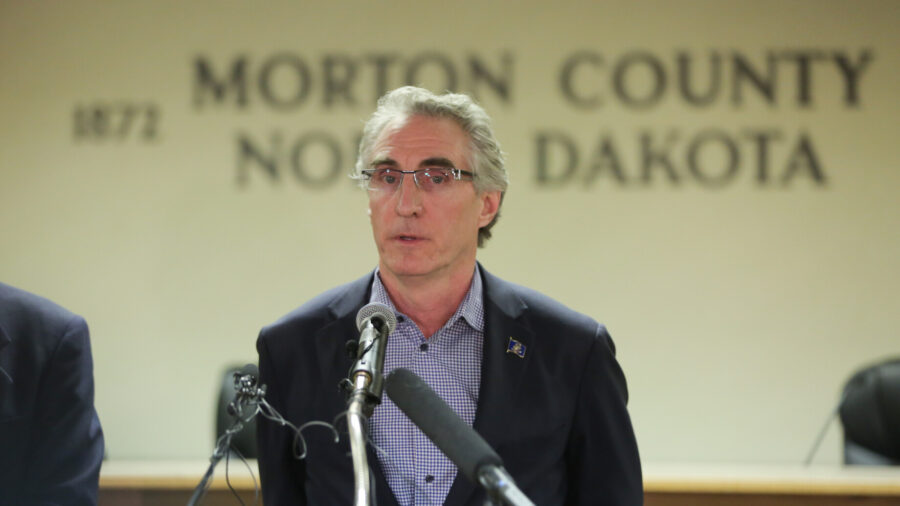North Dakota Gov. Doug Burgum has commended the oil and gas industry, describing it as a “powerhouse” and “game-changer” for the local economy, while criticizing the Biden administration for shifting its focus towards supposed green energy.
In a news conference on March 7, the Republican cited recent studies, saying the industry contributed more than a whopping $40 billion to the state’s economy in 2021. In addition to creating almost 50,000 jobs, it was responsible for more than half of the state’s tax revenue.
Recently released figures show that the oil and gas industry directly employed over 14,000 people in 2021. According to a study conducted by North Dakota State University researchers, over 35,000 people were employed in other related sectors within the industry.
A different study conducted by the Western Dakota Energy Association and the North Dakota Petroleum Foundation shows that over 50 percent of all taxes collected by the state in the last five fiscal years originated from oil extraction and production.
The United Nations (UN) holds that fossil fuels—which include coal, oil, and gas—are primarily responsible for changes in the global climate.
They believe extreme weather conditions, such as wildfires, storms, hurricanes, droughts, and floods in recent years, are a direct consequence of this. The UN referred to it as “code red for humanity,” potentially causing trillions of dollars in damages, as reported by AP News.
President Joe Biden has reportedly pledged to move the United States away from fossil fuels, having backed a landmark law accelerating the expansion of green energy, including wind and solar.
Burgum, during the news conference, pointed out that the oil and gas industry has affected every North Dakotan—regardless of their stance towards it.
“If you’ve got a kid that goes to K-12 school,” or a family member who drives on the state’s highways, or a faucet that delivers clean water, then know that “all of that’s been driven by the success and the productivity that we’ve seen from this industry,” he said.
According to Ron Ness, president of the North Dakota Petroleum Council, who spoke alongside Burgum, the biggest obstacles to the state’s oil and gas production have been “the federal regulatory climate and the Biden administration’s messaging to the public about the end of oil and gas.”
Yet another challenge is sourcing and retaining workers, according to Ness, who highlighted the state’s workforce shortage. Securing capital investments has also proven challenging.
“We still aren’t where we need to be with Wall Street and the investment firms on wanting to invest money into oil and gas,” Ness said.
Burgum suggested that reducing North Dakota’s income tax would put it in line with being able to compete with other oil-producing states, such as Wyoming, Texas, and Alaska—all of which have zero income tax.
In addition, he explained, investment in training a competent workforce and making access to affordable childcare more widely available would be a significant factor in helping to attract workers.
“The state’s never been in better financial shape, and a big thank you to the oil and gas industry for that. But once again, we find there are many headwinds under this administration. Rather than trying to sell clean U.S. energy to our friends and allies, we have an administration that instead would prefer that our allies around the world buy it from our enemies,” he asserted.
The Biden administration, meanwhile, is reportedly deliberating on whether to approve a significant Alaskan oil project. Supporters of the project say it would be of great economic benefit to indigenous communities, but critics argue that it’s contrary to Biden’s pledge towards green energy.
Shortly after assuming office in 2020, Biden terminated the Keystone XL oil pipeline. He also put any new oil and gas leases on federal lands on hold, citing the dangers of climate change. Despite the ban having since been lifted under a court order, Republican lawmakers argued that lease sales for new drilling rights remain limited.

